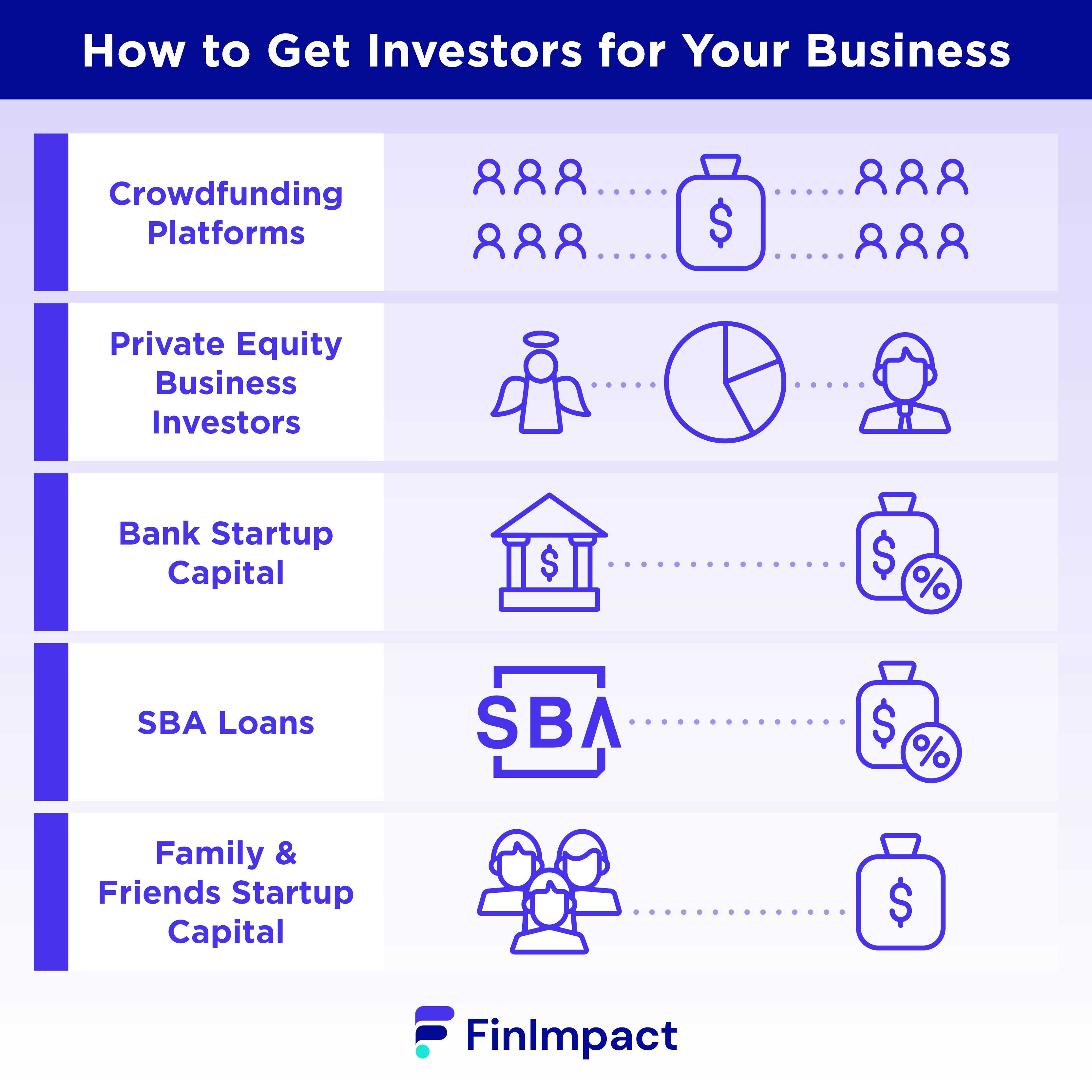| All content presented here and elsewhere is solely intended for informational purposes only. The reader is required to seek professional counsel before beginning any legal or financial endeavor. |
While it may seem like a daunting task, convincing someone to invest in your small business is actually easier than you might have thought. There are many individuals and organizations who are willing to invest in businesses that align with their goals and values. By understanding their preferences and criteria, and developing a compelling pitch, you can increase your chances of securing investment for your business. Building relationships and networking with potential investors can also be beneficial in securing funding for your venture.
Key Points:
- Take Your Time
- Be Thorough
- Detailed Business Plan
- Clarify The Financial Relationship Right For You
- Seek Guidance

Crowdfunding Platforms
- Crowdfunding platforms are online forums that connect small businesses in need of financing with pools of individuals and/or institutions looking to invest in small businesses.
- These platforms have become increasingly commonplace in recent years and now span all sectors of our economy, with a mix of debt offerings and startup capital.
- Some cater broadly to provide startup capital, while others favor sustainability-oriented organizations focused on environmental, social and governance (ESG) issues.
- Some are characterized by traditional monetary transactions; others embrace creative payment structures.
Many businesses figured out how to start a small business using investment from crowdfunding. Depending on your type of business some formats will be suitable and some not.
1. Donation-based crowdfunding
This is a philanthropic form of financing, where business investors do not expect to recoup their contribution. Generally, this is only accessible to project-specific endeavors or companies that meet certain ESG (Environment Social and Governance) qualifications.
2. Reward-based crowdfunding
When investors provide money in exchange for a deliverable, rather than a cash return. Oftentimes, this means gaining early access to a business’s planned product or service offering. Kickstarter is probably the best known reward-based crowdfunding platform in the market.
3. Debt-based crowdfunding
Commonly referred to as peer-to-peer lending, matches businesses with a pool of potential business investors. The lenders are provided basic information to evaluate the merits of the various businesses, and they have the ability to fund those they favor. LendingClub and Prosper are two of the better known peer-to-peer lending platforms.
4. Equity-based crowdfunding
They match businesses with a pool of equity business investors. Like peer-to-peer lenders, the investors have the ability to pick and choose the businesses they prefer. Unlike lenders, the equity investors assume a partial ownership interest in the businesses. This provides the potential for greater returns, but more downside risk than lending.

Private Equity Business Investors
- They buy ownership positions in startups and established companies exhibiting various levels of maturity.
- They are usually large institutional players such as pension plans, insurance companies, university endowments and charitable organizations.
- High-net-worth individuals who are traditional retail investors are becoming more prevalent thanks to technological advancements and more accessible investment vehicle offerings.
For most small businesses, there are two sources of Private equity (PE) financing: Angel investors and venture capitalists. Both seek an equity interest in your company, but their entry points differ:
1. Angel investors
- These are high-net-worth individual business investors or small groups of individuals who have the money, resources and backgrounds to provide startup capital.
- They usually make investments very early in the life of a business, often at inception. Angel investors can be hands-off, but most are inclined to want significant decision-making authority over the businesses they fund.
2. Venture capitalists
- Business investors who represent a more substantial segment of the PE (Private Equity) market.
- While angel investors are usually individuals focused on new companies, venture capitalists are generally highly organized firms focused on larger, more established companies.
- They actively invest in targeted companies, combine them into investment portfolios and offer access to the portfolios to downstream investors in exchange for lucrative fees.
Between venture capital and traditional bank loans, there are now many online funding options where you can apply for a startup business loan
PRO TIP: For small, relatively inexperienced businesses, you have a much better chance of getting money from an angel investor than a venture capitalist.

Startup Capital From a Banking Institution
First, consider what is startup capital. Why this makes sense for some startup businesses:
- Crowdfunding may not provide you enough money.
- Private Equity financing could entail giving away too much of your company.
However they can be difficult to obtain:
- Many small business loans entail in-depth application processes with stringent credit rating criteria.
- Especially true for startup business loans, which also tend to require personal guarantees.
- Means pledging your personal assets, such as automobiles or homes, as collateral.
- Doing so is far from ideal, as it puts your lifestyle at risk in the event of default.
- In some situations, pledging collateral may be the only way to secure the money you need.
PRO TIP: Take comfort in the fact there is no shortage of potential loans for your business. The key is to maintain a diligent and thorough approach to researching and evaluating your options.

SBA Loans (US Small Business Administration)
This is a suite of startup capital loans sponsored by the U.S. Small Business Administration (SBA), an independent government agency designed to facilitate domestic small business growth:
- The supportive nature of the program enables small businesses, including startups, to obtain loans that are otherwise unattainable.
- Most SBA loans aren’t issued by the SBA. Rather, they are partially guaranteed by the organization to encourage authorized lenders to extend financing.
- SBA is helpful in other ways, offering a variety of tools and educational materials to help small business owners plan, launch, manage and grow their operations.
For more detail on the SBA’s loan program and complementary resources, please visit the following link: SBA Loans.
Startup Capital from Family and Friends
Those closest to you may be eager to loan you money or assume an equity interest in your venture.
- Don’t be casual about this startup capital loan.
- Establish a contract outlining the terms and conditions of the agreement, along with the rights of your business and the investor.
- The contract doesn’t have to be meticulously structured, but it should contain enough detail to address any disputes that could arise over time. Please consult with an attorney.
Final Word
Now you've understood the basic principles of how to get investors for your business the path forward may still be blurry. If you want a startup capital loan, you need to do your homework. Finimpact.com is a good place to start.
With this in mind, we rank Torro near the top of the list of startup business lenders. This is largely due to its competitive loan limits, relatively flexible repayment terms and stellar user reviews. If you need funding for your startup or early stage business, this lender is definitely worth a look.
